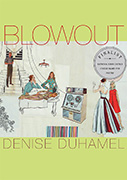» Interview
Interview: Denise Duhamel


Denise Duhamel is the author of How the Sky Fell (1996), Girl Soldier (1996), The Star-Spangled Banner, winner of the Crab Orchard Poetry Prize (1999), Kinky (1997), Queen for a Day: Selected and New Poems (University of Pittsburgh, 2001), Ka-Ching! (University of Pittsburgh, 2009), Blowout (University of Pittsburgh, 2013), and SCALD (University of Pittsburg Press), out in early 2017 after this interview was conducted. She has received a National Endowment for the Arts Fellowship and served as the guest editor of The Best American Poetry 2013.
In this interview, we focus on Blowout, that rare poetic collection that expertly bridges the distance between the earthbound and the abstract. The pieces are utterly approachable but still manage to surprise in their perception. Duhamel distills decades into the moments that most inform the path from childhood love to the adult dismantling of those early aspirations, sparing no one, least of all herself, along the way. We are also happy to share three new poems by Denise Duhamel here on Aquifer: The Florida Review Online.
Danielle Kessinger for The Florida Review:
I just want to say that I enjoyed this book so much. I identified so much with what you said, which is so rare. Reading, you may think, that’s beautiful, but you don’t necessarily see yourself in other people’s work. But with so much of what you wrote, I thought, I have had that experience. When you were writing, did you have an idea that you would speak to that feeling, make those connections with readers?
Denise Duhamel:
No, in fact I thought, like anybody who goes through a divorce or bad breakup, that my situation was so particularly weird and worse than anyone else’s, kind of over-dramatic about it. I thought it was such like a midlife story, but love is love and being betrayed is being betrayed whether you’re seventeen or ninety-nine.
TFR:
I also wondered if you made a conscious choice to talk about things that were a little bit more every day, down to earth.
Duhamel:
I had a friend say “When you write, you have God and a banana, and then there’s a whole world in between.” So, for me, the god, the abstractions, I’m not really interested in that much. I’m really more interested in the day to day and how we get through these things, and using pop culture or using our friends, or reading bad self-help books, whatever it is that get us through. I was more interested in that than a big statement.
TFR:
Given the times we suddenly find ourselves living in, is there even more pressure to write in the moment?
Duhamel:
Yes, absolutely. I was thinking so much about how my next book, which is not out yet, is going to be called Scald. [The book came out in February 2017, after this interview.] It’s about feminism and it’s dedicated to three different great feminists. I was so in the zeitgeist of a Hillary Clinton presidency and women, and now I feel so unmoored. But I’m so glad I wrote it when I wrote it because, while I wasn’t thinking of Hillary necessarily when I was writing it, I felt this movement towards women and the feminization of power and saving the planet. Now, we really have to stay in the moment and not stick our heads in the sand. I mean you may have to stick your head in the sand for a week to survive, but then we have to come out strong.
TFR:
I felt like I often heard people say, “We are having more conversations about race during Barak Obama’s presidency and we will talk more about gender with a female president.” Do you feel like we will talk more or less about gender given the president we ended up with?
Duhamel:
He’ll talk a lot less about gender and even his wife will say less. I was reading something just this morning about how she wants to be more like Jackie O. It’s so retro and cultural regression to the max, right? She really wants to go back to the 1960s pillbox hat and not even say anything. We are in big trouble, but I also think because this election is so egregious and Clinton didn’t lose to a man who was moderate or even a Mitt Romney or John McCain, she lost to a misogynist who calls women the worst possible names, I think women are not going to give him a pass. We are going to come back strong, especially since we had a taste of what could have been. I can’t imagine women going, Oh well, we’ll let it go.
TFR:
No.
Duhamel:
I think we’ve been letting it go for decades and centuries and I don’t think we can let it go anymore.
TFR:
I think that’s also what I admired about your book. You didn’t let it go. You talked about it.
Duhamel:
I gave a reading this morning with Catherine Bowman who had this wonderful poem about going through a divorce and then going back to etiquette books and Emily Post. Emily Post had this weird quote about how when a woman is going through a difficult time, like her husband leaves, the worst thing she can do is mention it because that’s not ladylike. But the realities of our everyday lives can be powerful and help us connect even if we think we’re the only ones going through it. If you put it out there it’s very possible that a lot of people will be nodding, oh yes, me too.
TFR:
I had wondered–since you had a poem talking about a new friend who wonders if you steal stories from people–whether you found that people are more concerned they will end up in your poetry, or more interested in ending up in your poetry.
Duhamel:
It’s very funny. Even though Blowout is very memoir-esqe, I think every time you try to write a poem you’re going towards a bigger truth than the truth of what happened on this day. You have to always be fabricating. In some ways people like to think they’re in the poems when they’re not or think, I can’t believe you wrote about me. And I think, no I wasn’t writing about you or vice versa.
TFR:
Are there certain poems you run by people prior to publication?
Duhamel:
Yes.
TFR:
Have you ever then not ended up publishing something based on someone’s reaction?
Duhamel:
No. It’s only if I’m afraid I’m going to hurt someone, which is so female. I don’t think men think like this, but maybe they do. I would never want to intentionally hurt an innocent party. It’s my reaction to what happened. The people or villains in the poems have their own side of the story.
TFR:
You have a couple of poems in this collection where the speaker is much younger. What do you think it is about pre-adolescent love that lingers?
Duhamel:
Especially when you go through a divorce or a really bad breakup, you kind of have to ask yourself, it’s got to be me on some level. It feels like you have to at least investigate that, so I found myself going back to a boyfriend I had in kindergarten who I wanted to do things that he wouldn’t, or a painter that I knew on the lower East Side, and these patterns of disappointment. That was really fun to do actually.
TFR:
The fourth-grade boyfriend was good.
Duhamel:
Right? You finally get someone who really likes you and you just miss him for whatever reason.
TFR:
The book isn’t completely chronological but there does seem to be a lot of forward movement. Did you work in some purposeful chronology to the book?
Duhamel:
I did. I tried really hard because I didn’t write the poems in order. When you put a book together you’re just kind of culling from poems you’ve written over a span a time. “How It Will End” is the first poem, so you think it’s going to give away the ending, which it both does and doesn’t.
TFR:
You had mentioned in one of your poems becoming a Reverend of the Universal Life Church, which I did as well.
Duhamel:
All right. [Exchange of high fives.]
TFR:
You talk about it being appropriate, having been divorced, but I wondered if you thought being a poet also gave you a special ability as an officiant, someone who could produce ceremony.
Duhamel:
I didn’t think of it like that at the time. I was just doing it to help my niece who didn’t want a traditional religious wedding, so I said I would do it. I had another friend who had done this, and you did it. It seems like a poet thing to do. I have to say, it’s almost like you put on the cloak of that official and you get all this wisdom. One of the women at the wedding had just lost her sister and she was my age and her sister died of cancer and she was crying in the bathroom with her daughter and then the daughter said, “Talk to her, she’s a reverend.” And I thought, oh no, oh no, oh no, but I rose to the challenge, and I said your sister is with us now. Don’t ask me how I said that, but she was comforted. So, I think there are these roles that we can play. I don’t know if her sister was there or not, but I felt like I’m going to comfort her and I did since I’d taken on that role
TFR:
You have to wonder the reaction if the daughter had said, “Don’t worry, there’s a poet here.”
Duhamel:
That would be the best, if they said, “Go talk to a poet. They see the big picture.”